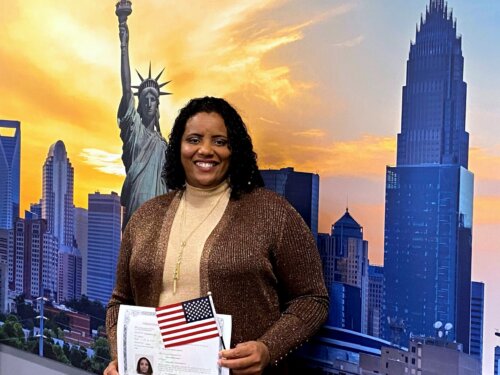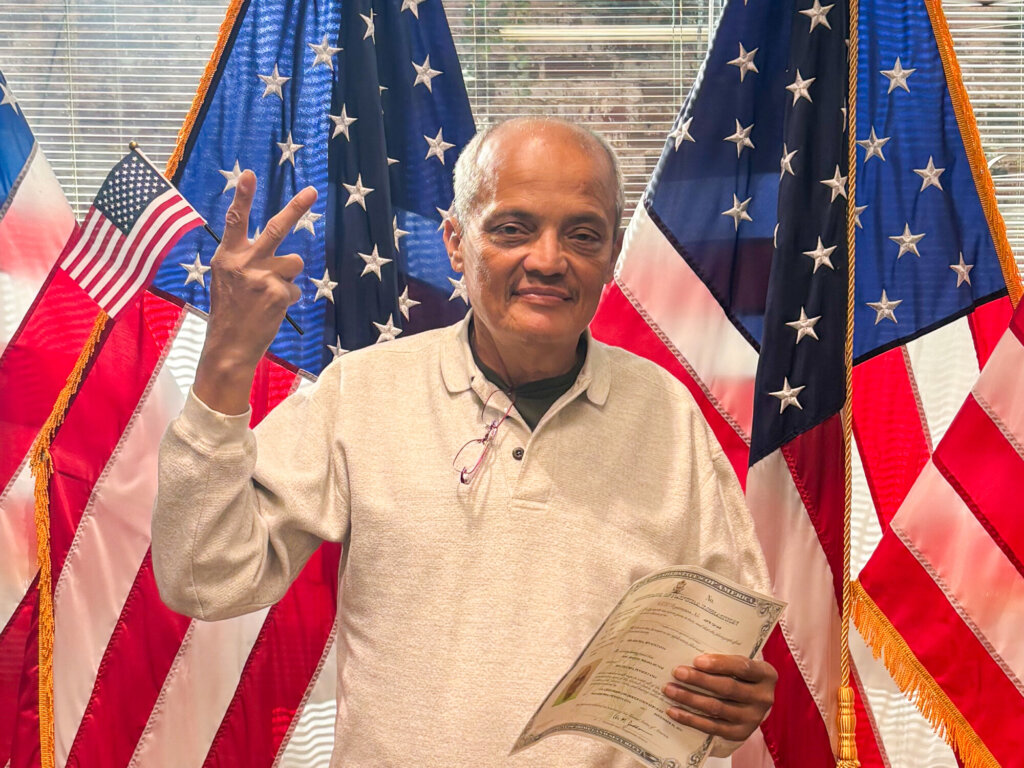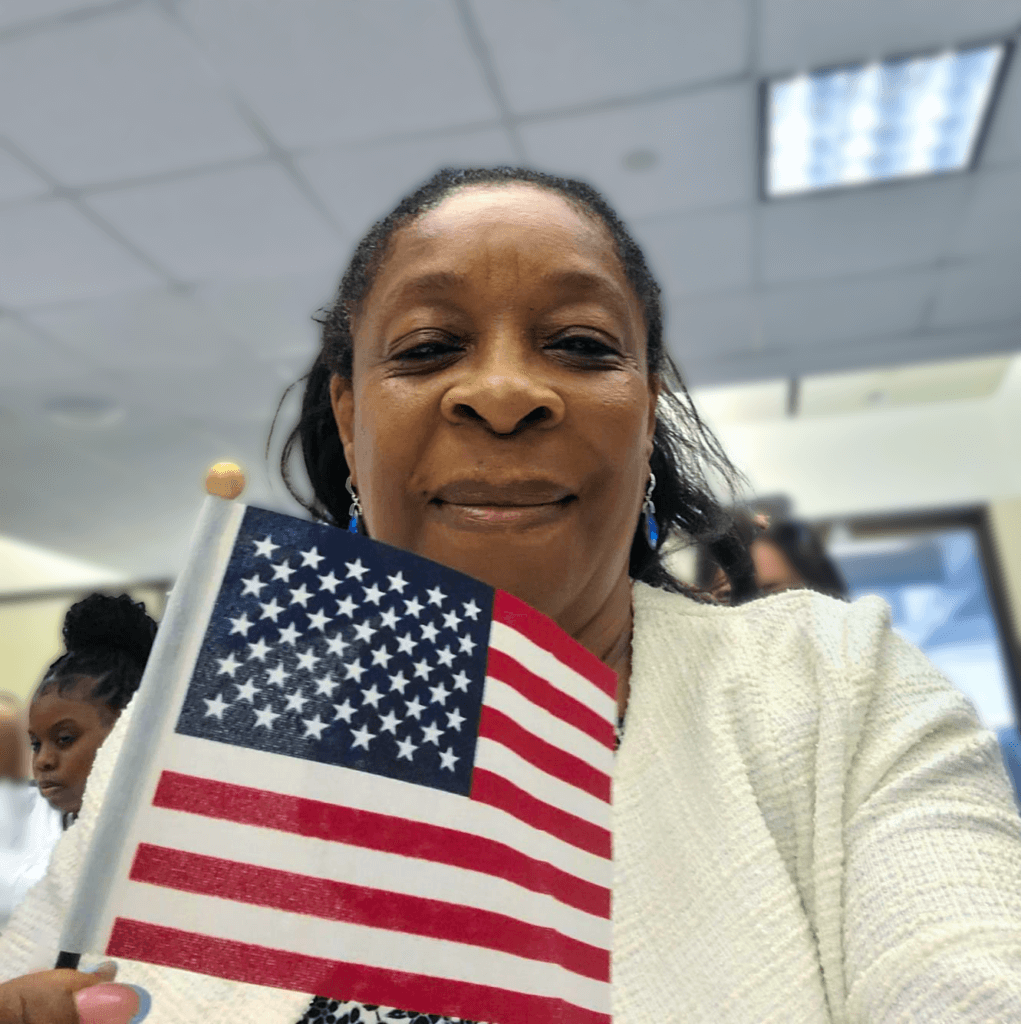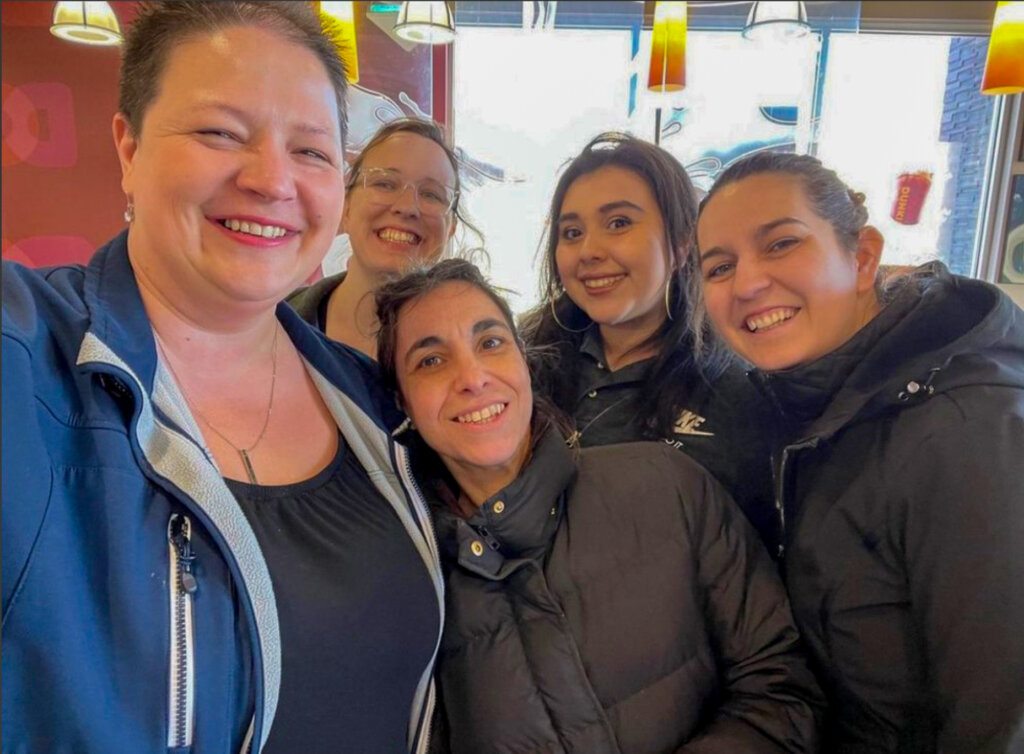Yisel Pomier Maren: Now that I have the vote, believe me, I’m going to use it.
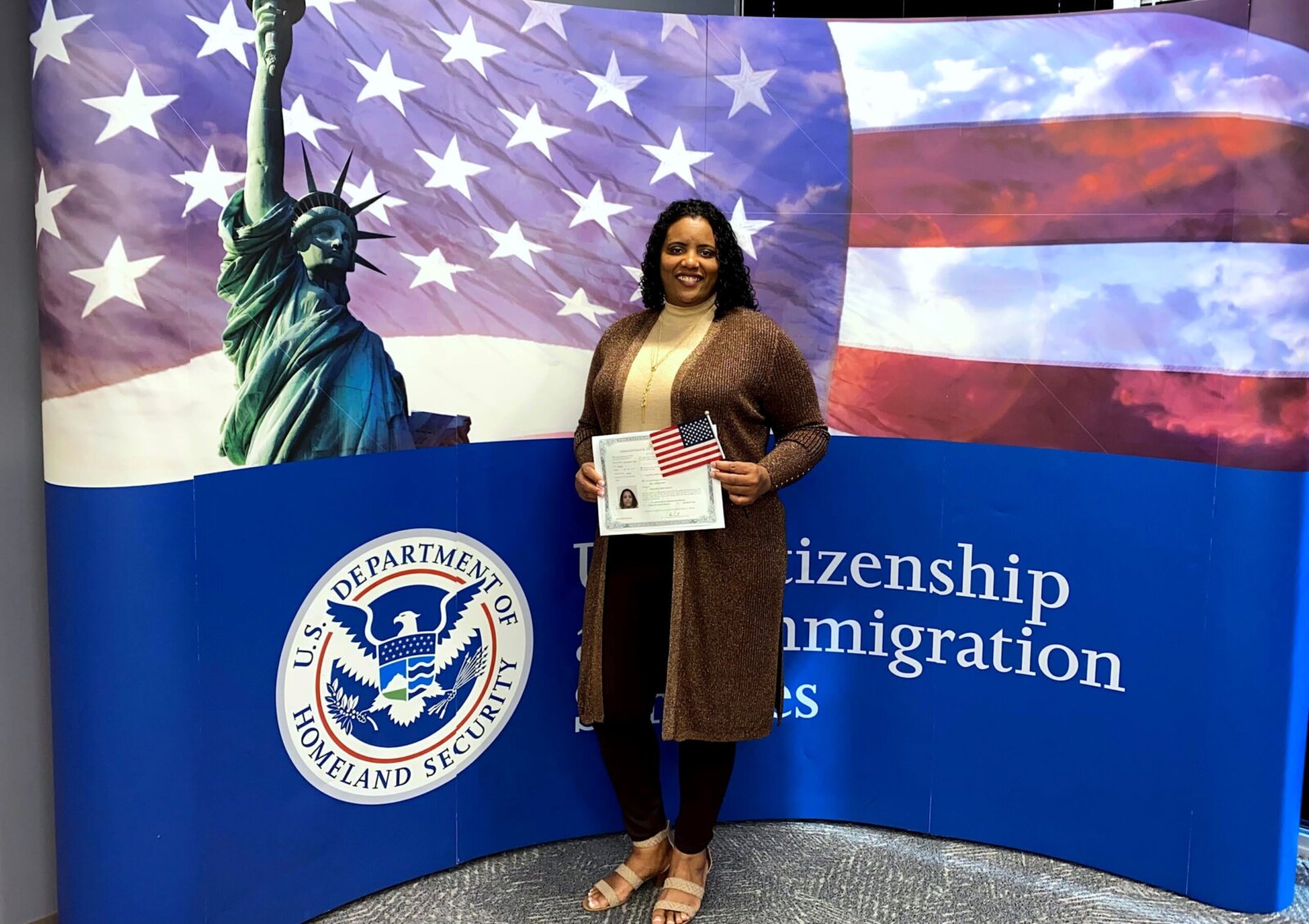 Yisel took her oath of citizenship on January 7, 2020 at a USCIS field office in Charlotte, NC. (Photo courtesy of Yisel Pomier Maren)
Yisel took her oath of citizenship on January 7, 2020 at a USCIS field office in Charlotte, NC. (Photo courtesy of Yisel Pomier Maren)Explore More
I am originally from Cuba. Living in Cuba the health system is completely free, and you have free education, but you don’t have any economic freedom. You cannot be in disagreement with the government there. They have just one party. You are either with the revolution, or with the revolution. You are either with Fidel, or with Fidel. I believe in freedom of religion. I believe in different opinions, and I believe in change. I didn’t have freedom of speech. I believe in a lot of stuff that I couldn’t express in Cuba and I didn’t feel free.
My mom always said knowledge is power and when you graduate you will see that it will be different. I was able to go to school and I got my first bachelor’s degree in Art History, then I studied for a second bachelor’s degree in Direction of Cinema, Radio, and TV. I said, “Mom, now what?” She said, “You have to keep going because, remember, in Cuba everybody has a bachelor’s, you have to have a master’s.” I got a master’s degree, but my salary was $12 monthly as an assistant director at the television station. But, with a $12 salary, you cannot eat three times a day. I did the math, maybe for 10 days at the end of the month I ate two times a day. I spent almost half my salary on public transportation going to work. I have two bachelor’s degrees and a master’s in community development. Still I was in the same situation—without money, living with my parents. That’s when I decided to focus on getting out of Cuba.
Leaving Cuba was hard for me, coming from a really poor family. At one point in my life my sister and I had to share the same pair of shoes. We are just nine months apart. My mom put my sister in the morning class and put me in the afternoon class. I had to wait for her to come home to put on the same pair of shoes that she was wearing and go to school. But my sister’s shoe size is six and I’m a twelve! (That’s why I now have a lot of shoes.) I didn’t have money to get out of the country. I didn’t know anybody outside of Cuba. The only thing that I had was my brain.
I love cinema and every year I was able to attend the Latin American film festival in Havana. That’s where I met a guy from Venezuela with a business selling computer, television, and radio parts. I told him I can sell anything, I’m good at selling. He said, “Yeah, everybody says that.” I told him I would show him. Eventually I convinced him that I was good at talking and good at selling. I told him, “Cuba needs old television parts that nobody’s going to buy in other places in the world where they have flat screen TVs. I will sell that for you.” I did and he was super impressed and then he invited me to Venezuela and that’s how I originally got out of Cuba in 2012. I went from selling television parts to selling avocados, but I wasn’t able to get a good job without documents. I was in Venezuela for two years before I put the money together to start my journey to the U.S.
I arrived at the U.S. border on November 8, 2014. There was a “wet foot, dry foot” regulation before President Obama ended it in 2016. You have to show them that you are Cuban and want asylum. I had been walking through the jungle, jumping, hiding, I had forty dollars with me, one set of clothes, my Cuban ID and a copy of my passport that I kept hidden on my body. The immigration officers were super rude and super mean. They kept me there overnight and gave me a hard time. But I just thought, what are you going to do with me? Do it faster because I’m starving. I haven’t taken a shower in a month, and I’m done.
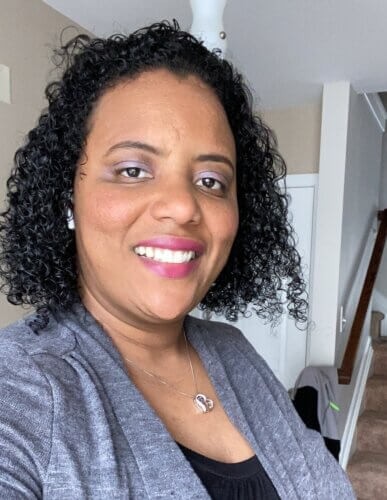
I have a friend, we went to the University together in Cuba, and she moved to Charlotte, North Carolina. When I got to Houston, another friend bought me an airplane ticket to Charlotte and I’m still here. After I got documentation, I got a job in a factory on an assembly line. I told my girlfriend I’m going to learn English in five months and I’m going to get out of this factory. I will find a job in customer service. After four months, I began working at AT&T selling phones. It was part time, but I was really good. I was the number four top seller because every time I set my goal, I tripled it.
I was desperate to learn English. I think superfast in Spanish and I was frustrated that I couldn’t speak fast in English. I went to Central Piedmont Community College to improve my English. I removed all Spanish from my life. I put headsets on all the time to practice, practice, practice. I went back to community college again to improve my writing skills. I wanted to be bilingual and I wanted to do what I love, working with communities. While I was studying, an advocacy position opened up at the Latin American Coalition (LAC). Every word of the description had my name on it. I thought, “Wow! This is me.” I got an interview and they gave me the job.
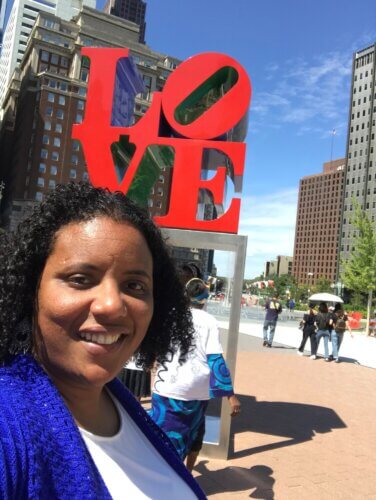
It was my plan all along to become a U.S. citizen. I was waiting, counting the days. I studied my citizenship questions. You can apply three months before the five-year date that you become eligible and I did that. I had a colleague, Ivonne, at LAC, who is my friend as well. I kept asking her, “Ivonne, can I apply? When can I apply?” And she would say, “You know all of that!” But I thought it’s good to double check because things can change. I was saving money and worried that USCIS would increase the prices. I’d say, “Ivonne let’s do it right now! The prices are going to increase!!” Ivonne would tell me to calm down. I was like a child getting her first candy. I used to help at the NAC (New Americans Campaign) citizenship workshops and count down the days until I could apply too. When the time finally came to fill out my citizenship application, Ivonne said, “You know how to do it.” But it’s not the same. I trust Ivonne, I don’t trust myself doing my own form. And when Ivonne fills out a form, she’s so calm, you know that you are in good hands.
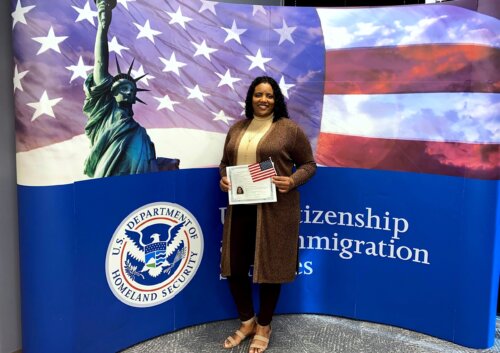
I became a citizen on January 7, 2020. I went and I bought expensive clothes for that day because it was my day. I wanted to be professional, and I wanted to be elegant, but I wanted to be cute. It was so nice to see how many people from different countries were taking that oath. The guy next to me was from the Middle East. It was super hard for him to get citizenship and super expensive. He was waiting 20 years for citizenship and he was crying away. We hugged each other. I didn’t even know that guy, but I thought, “You are my brother.” It was beautiful, but at the same time it was sad for me that I received my oath at a time that this president is spreading so much hate. I saw so many people from all over the world that are willing to bear arms, to defend this country. I saw people crying because we believe in the freedom and in the beauty of this country. We received a recording from this president that doesn’t believe in us. The best thing was that the immigration officers who were there, they welcomed us here, they don’t hate us. And they know that we are taking this oath with all of our heart. That was beautiful.
I am the same Yisel, but I’m more free now. I don’t feel that you’re going to be fully free until you’re a U.S. citizen. I can breathe better. I have a new job as a field worker for the National Domestic Workers Alliance. I’m not scared to go out of the country because I know that I can come back. Being a green card holder doesn’t guarantee that they cannot stop you from coming back to the country, even if you have been building a family or a life for years. After the oath ceremony I was encouraging people to register for voting because you could do it right there. “This is the time. This is the time. Freedom—freedom of speech after you take the oath.” I don’t know why people don’t vote. Here people take everything for granted. When you don’t have to fight for it, you don’t understand. I grew up with so many “no’s,” now that I have the vote, believe me, I’m going to use it.
